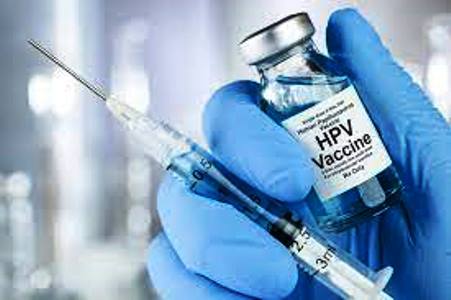As the Federal Government gets set to launch the Human Papilloma Virus (HPV) vaccine in Abuja on Oct. 24, it has debunked myths making the rounds which claims that the vaccine is intended to reduce fertility in girls.
Dr Uche Nwokwu, the acting Director, Clinical Services, National Institute for Cancer Research and Treatment (NICRAT), dismissed such claims in an interview in Abuja on Wednesday.
HPV is a virus that transmits through skin-to-skin contact and can develop in anyone who is sexually active.
HPV is a primary cause of cervical cancer and other cancers, including cancer of the vulva, vagina, penis, or anus, and by protecting young girls before exposure to the virus, it can reduce incidences of the devastating disease significantly.
The Ministry of Health and Social Welfare, in partnership with Gavi, the Vaccine Alliance, WHO and UNICEF is, therefore, set to launch the vaccine, followed by a roll-out in some selected 16 states namely; Abia, Adamawa, Akwa Ibom, Bauchi, Bayelsa, Benue, Enugu, FCT, Jigawa, Kano, Kebbi, Lagos, Nasarawa, Ogun, Osun and Taraba.
The acting NICRAT director, therefore, explained that though the vaccine could have some mild side effects like every medicine, the side effects would be explained on the leaflets of the vaccine.
Nwokwu said “the myth about the vaccine reducing the fertility of girls is out of place and not true, which are the reasons people are afraid.
“At the point where the inoculation is done, there could be some reaction around the area; it could be pain of injection, someone may have mild fever, these are side effects of the vaccine but it is not something that should discourage anybody from getting it.
“The benefits of the vaccine are greater than the minor fever reactions at the site of the injection and does not reduce the person’s fertility.
“Also, there is no known long term effects discovered and for now; there is no evidence that it has any adverse effects.”
Describing the nature of the virus, he said it is responsible for a lot of disease conditions, including cancer of the cervix or the uterine cervix.
He said there are different stereotypes or variants of HPV, but that the one responsible for cancer of the cervix is stereotype 16 and 18, while the other stereotypes could cause other warts.
He added that the variants 16 and 18 are responsible for almost 70 to 90 percent of cancer of the cervix.
He said “many people may have the virus and will not come down with cancer of the cervix.
“It results in cancer when the body is not able to clear the virus. The virus is weak so it’s not as potent as other viruses like Hepatitis or HIV.
“Someone can have the virus or get exposed and the person’s immune system will clear the virus.
“However, in some cases where the immune system is not able to clear the virus, it can cause mutation of the cervix and lead to cancer of the uterine cervix.”
He also said that in some cases, it is common in people who have multiple sexual partners because having multiple exposures could increase the virulence of the virus.
He explained that “there is danger if young girls are being exposed to HPV when their cervix is not yet mature, that is when they are still undergoing transformation.
“There is a particular area of the cervix that is called transformation zone. As the young girl is growing, some part of the cervix is pushing out just for maturity purposes.
“When that transformation is on-going, that place is still fragile and immature. So if the girl is exposed to the virus at that time when that place is maturing, the virus has the capacity to take advantage of the situation and cause problem.”
According to Nwokwu, the vaccine is very important as it prevents girls from any risk of contracting the virus in future.
He said “that is why the target of the HPV vaccination is young girls who are not yet sexually exposed and people who were still very young.
“The target now is for girls between nine to 14 years of age. That is when they are getting to that puberty maturation stage and not yet sexually exposed.
“The other reason for targeting those who are not yet sexually exposed is because once someone has that virus, it does not make sense to take the vaccine.”
The NICRAT official recommended that countries that have the capacity should vaccinate both girls and boys “because boys could have warts on the penis too, even though those warts do not result into cancer.
“So, in some countries, they vaccinate both the girls and the boys, but in our country, our major concern is the girls because even when the boys have the virus, the problem with them is not as much as when the girls have it.
“By the time the economy improves and we have the vaccine everywhere, we can as well give the boys and girls so the targets for now in our National Strategic Plan for prevention of Cancer of the Cervix is to immunise girls.
“We are also hopeful that it will be integrated into the Primary Health Care National Programme on immunisation so that it becomes routine.”
He, however, said that for girls who have been sexually exposed, they would need to do HPV DNA test to know their status.
As for the dosage, he said, it depends on the brand of vaccine being used.
“However, what is important is that if someone is able to take the appropriate dose, it confers life immunity.”
He added that the brand of vaccine Nigeria is inaugurating is the one that has potency against four variants of HPV.



